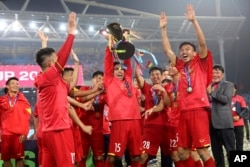It was an otherwise ordinary Tuesday night in Vietnam’s financial hub of Ho Chi Minh City. But on December 11 thousands of people lined streets in the city center until after 1 a.m. to blast air horns and cruise around in utility trucks packed with football (soccer) fans waving Vietnamese flags. Some even painted the flag, a single yellow star on a red background, on their faces.
A similar scene unfolded Saturday in the capital Hanoi, and for the same reason: in both cases, Vietnam’s football team had won ASEAN Football Federation matches. The game Saturday handed Vietnam the top spot in a group of five Southeast Asian countries.
Loud, late-night street partying reveals a new sense of patriotism driven by mass media, communist rule and pride in a country long hobbled by war but starting to emerge.
“Now although they’re fighting, they’re relying on sport to stimulate their sense of nationality,” said Tai Wan-ping, Vietnam-specialized international business professor at Cheng Shiu University in Taiwan. “It’s a hard chance to get, so everyone is satisfied and proud.”
Emergence after decades of setbacks
Vietnam is emerging from decades of war, poverty and efforts to jumpstart its economy. The country fought off its French colonists in the 1940s, the United States in the 1970s and, later that decade, the Chinese on their northern border.
Today a once desperately poor population is prospering on foreign investment in factory work, a driver of economic growth of around six percent per year since 2012.
“Vietnam is without a doubt one of the most patriotic countries in Southeast Asia, and its citizens are immensely proud of their heritage,” said Murray Hiebert, deputy director of the Southeast Asia Program at the Center for Strategic and International Studies in Washington.
“Perhaps it’s because Vietnam is a long, narrow country fronting on the sea that has had to defend itself regularly against foreign invaders for over two millennia,” he said.
Communist education, mobile media
Vietnam’s Communist government – like those in other countries – helps foster patriotism through formal education and the occasional state-approved mass rally, scholars say.
The prevalence of smartphones makes it easier now than ever for young people to watch football match videos in groups, stoking excitement about the national team, including some of its stronger players, said Carl Thayer, professor emeritus with the University of New South Wales in Australia.
“What’s different about this is, it’s spontaneous,” Thayer said. “All the other mass mobilizations are run by the party and its organizations. And yeah, they beat drums and they drive around and they can whip up enthusiasm, but this is actually genuine and it’s because it’s that way, it skirts the rules of public behavior that the regime would rather not see violated, but how can you stop exuberance?”
Vietnamese officials tolerate post-game revelry as long as it doesn’t “lose control,” Tai said.
A thing about soccer
Vietnamese are fascinated with football itself too, another cause for enthusiasm. Even during a World Cup, which Vietnam has not played in, Hanoi can “erupt” when people’s favorite teams score, Hiebert said.
Mass partying broke out when Vietnam qualified for the final of the under-23 Asian Cup football event in January and when the country made it into the Asian Games semi-finals in August.
Football for some is a proxy for national strength. Vietnamese fans watched the ASEAN cup to see how their players would fare against the bigger Indonesia and more modern Malaysia, Thayer said.
The ASEAN Football Federation covers 10 countries in Southeast Asia. Victories this month against Malaysia, which placed second in the group of five, earned Vietnam its first regional title in 10 years.
But the celebrations carry no hint of deep dislike for rival countries, Thayer added.
“I don’t hear that where it gets into chauvinism or hyper nationalism, it’s just reaffirming Vietnam’s identity across north, central, south and the extreme pride that they can play on a world stage and do well,” he said.






